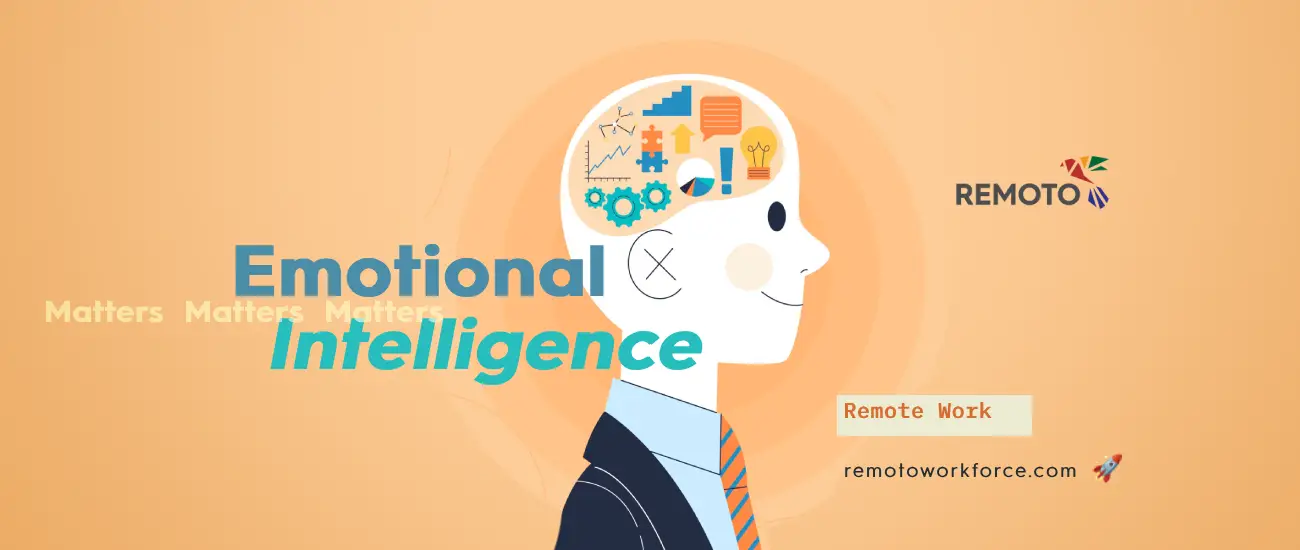Remote work has shifted the spotlight from a physical presence to an emotional presence. The ability to manage emotions, communicate clearly, and understand others has become a defining skill for remote professionals. Emotional intelligence, often overlooked in technical settings, is now one of the strongest indicators of success in distributed teams.
Workplaces no longer depend on watercooler chats to foster collaboration. Instead, they rely on asynchronous messages, video calls, and digital platforms. This change makes emotional intelligence more than a nice thing to have. It’s a key part of how teams connect, solve problems, and build trust.
In remote environments, professionals who know their own emotions and know how others may feel tend to do better than those who don’t. Whether you manage a team across time zones or work alone, emotional intelligence helps you understand and work together.
In this blog post, we analyze how emotional intelligence plays a crucial role in remote work and your business.
Communication Without Context Requires Empathy
In traditional offices, tone, posture, and facial expressions provide clues that help decode messages. In remote setups, those signals are often filtered out by screens, chat apps, or email threads. Misunderstandings arise not from intent but from a lack of emotional context.
This is where emotional intelligence steps in. Empathetic professionals pause before responding, consider how their words might land, and adjust their communication style accordingly. They understand that remote work magnifies small missteps, turning minor issues into larger conflicts if emotions are ignored.
Leaders and team members who practice emotionally intelligent communication foster clarity and psychological safety. This skill allows teams to stay aligned and motivated, even when everyone is working in different places at different times.
Self-Awareness Keeps Burnout in Check
Remote work may offer flexibility, but it often blurs the line between work and rest. Many remote professionals overextend themselves, miss emotional warning signs, and eventually face burnout. High emotional intelligence offers an internal early-warning system.
Self-awareness is a key part of emotional intelligence. It helps professionals know when they’re mentally overwhelmed, anxious, or disconnected. Those who cultivate this awareness are better at setting boundaries, managing time, and asking for help when needed.
This also extends to team dynamics. Leaders with high self-awareness set the tone by modeling sustainable work habits. They encourage balance, foster resilience, and help others navigate emotional challenges without judgment or stigma.
Adaptability Drives Remote Team Success
Distributed teams face constant change—new tools, shifting goals, global crises, and unexpected pivots. Emotional intelligence equips professionals with the flexibility to navigate this uncertainty without losing direction.
Adaptable professionals acknowledge frustration or confusion but respond with curiosity instead of resistance. They remain open to feedback, adjust workflows quickly, and support their colleagues through transitions. This ability to pivot with empathy makes emotionally intelligent employees reliable under pressure.
In remote teams, those who manage their reactions and help others adapt tend to rise as informal leaders. They turn doubt into momentum and foster a sense of stability that allows entire teams to perform better.
Conflict Resolution Happens in the Gaps
Disagreements are natural in any work environment. In remote settings, unresolved tension can linger in silos, chat threads, or passive-aggressive replies. Emotional intelligence helps address these conflicts early, directly, and respectfully.
Professionals with strong emotional skills identify tension, understand the root causes, and choose constructive language to move forward. They don’t avoid difficult conversations. Instead, they approach them with empathy and curiosity.
This proactive mindset reduces friction and builds stronger relationships across departments, cultures, and locations. When conflict is handled well, trust increases, and collaboration becomes more meaningful.
Leadership Looks Different in Remote Teams
Remote leadership goes beyond managing tasks. It requires emotional availability, clear communication, and a keen sense of each team member’s experience. Emotionally intelligent leaders check in without micromanaging and build morale even without face-to-face interaction.
These leaders recognize when someone is disengaged or struggling, even if productivity hasn’t dropped. They encourage team members to share concerns, praise contributions, and make space for vulnerability without making it feel like weakness.
The most effective remote leaders balance performance expectations with emotional support. They know how to create culture through a screen, not just through strategy documents or virtual town halls.
Hiring for Emotional Intelligence, Not Just Skills
When evaluating remote talent, technical ability is no longer the sole priority. Hiring managers now prioritize emotional intelligence alongside experience and credentials. The ability to work autonomously while staying emotionally connected with a team has become a non-negotiable requirement.
Behavioral interviews, scenario-based questions, and reference checks can all help assess emotional maturity. Asking candidates how they handled conflict, gave feedback, or stayed motivated during difficult times reveals far more than a résumé.
Companies that prioritize emotional intelligence in hiring build teams that communicate better, support each other, and remain resilient during rapid change. These are the teams that thrive in remote-first environments.
Training the Soft Skills That Matter Most
Emotional intelligence is not fixed. It can be developed with the right training and culture. Remote companies that invest in emotional skills training, such as active listening, conflict resolution, and empathy, see improvements in both performance and retention.
Workshops, coaching sessions, and peer learning programs help individuals reflect on their habits and build stronger interpersonal connections. These initiatives are not just for managers. Everyone, from engineers to marketers, benefits from practicing emotional awareness.
Over time, these small efforts shift team culture. Emotional intelligence becomes part of the operating system of the company, woven into onboarding, meetings, and day-to-day collaboration.
Remote Work Needs a Human Core
Technology enables remote work, but emotional intelligence sustains it. Tools alone cannot build trust, resolve conflict, or spark engagement. That work happens in the space between tasks: in conversations, reactions, and shared challenges.
As remote work becomes a permanent part of the employment landscape, emotional intelligence will continue to separate average teams from exceptional ones. Companies that recognize this truth will design remote cultures that are both productive and humane.
Remote professionals who hone their emotional intelligence will become the people everyone wants on their team. They make work feel less distant and more like a shared mission worth showing up for.














